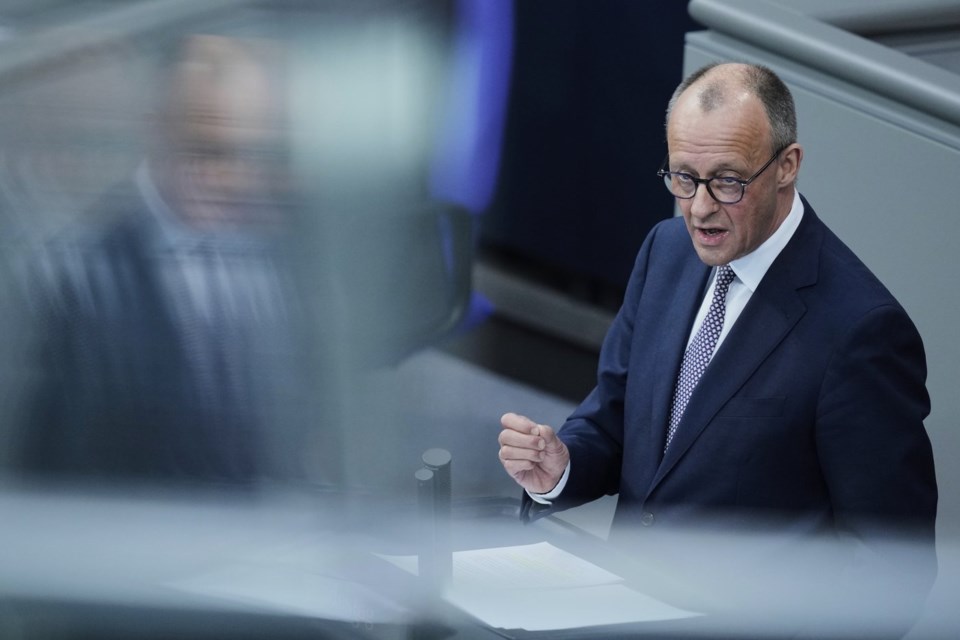BERLIN (AP) ŌĆö GermanyŌĆÖs would-be next chancellor, , won lawmakersŌĆÖ approval Tuesday for ambitious plans to loosen the nationŌĆÖs strict debt rules for higher defense spending as doubts mount about the strength of the trans-Atlantic alliance, and to set up an enormous fund for investment in its creaking infrastructure.
Merz passed a major test as the outgoing parliament voted 513-207 in its final meeting to approve .
The decision helps smooth the way for a governing coalition of MerzŌĆÖs center-right Union bloc and the center-left Social Democrats of outgoing Chancellor Olaf Scholz after he won . But he still faces plenty of work to seal a deal in ongoing talks.
Easing off the brake
The plans needed a two-thirds majority of at least 489 votes in parliamentŌĆÖs lower house, the Bundestag, because they involve changes to GermanyŌĆÖs strict self-imposed borrowing rules ŌĆö the so-called ŌĆ£debt brake,ŌĆØ which allows new borrowing worth only 0.35% of annual gross domestic product and is anchored in the constitution. That forced the prospective coalition partners with the environmentalist Greens to get enough votes.
The package will exempt from the debt rules spending on defense and security, including intelligence agencies and assistance to Ukraine, worth more than 1% of GDP. It also foresees a 500 billion-euro ($544 billion) fund, financed by borrowing, to pour funding into GermanyŌĆÖs and help ŌĆö EuropeŌĆÖs biggest ŌĆö to growth.
At the GreensŌĆÖ insistence, 100 billion euros from the investment fund will go into climate-related spending.
ŌĆśWhatever it takesŌĆÖ
The plans amounted to an about-turn for Merz, whose party had spoken out against running up new debt before the election without entirely closing the door to future changes to the ŌĆ£debt brake.ŌĆØ The Social Democrats and Greens had argued for a reform of the borrowing rules ŌĆö arguing that Germany, whose debt load is relatively low, has room to borrow more.
Recent weeks have brought new urgency to efforts to further strengthen GermanyŌĆÖs . The outgoing government created a special 100 billion-euro fund to modernize it, which also helped Berlin meet the current NATO target of spending 2% of GDP on defense. But that pot will be used up in 2027, and doubts have grown recently about the Trump administrationŌĆÖs commitment to .
Merz said that Germany and Europe must quickly strengthen their defense capability and that ŌĆ£ŌĆśwhatever it takesŌĆÖ must also go for our defense now.ŌĆØ
On Tuesday, he pointed to the danger from Russian President Vladimir ŌĆ£PutinŌĆÖs war of aggression against Europe ŌĆö it is a war against Europe and not just a war against UkraineŌĆÖs territorial integrity.ŌĆØ He pointed to suspected Russian sabotage and disinformation in Europe.
Merz said the prospective German governmentŌĆÖs move should be ŌĆ£the first step toward a new European defense community,ŌĆØ which could include countries outside the European Union such as Britain and Norway.
The Social DemocratsŌĆÖ co-leader, Lars Klingbeil, said that ŌĆ£Europe stands today next to an aggressive Russia on one side and an unpredictable United States of America on the other side.ŌĆØ He said he favors doing everything to maintain ŌĆ£indispensableŌĆØ trans-Atlantic cooperation, but ŌĆ£we must now do our homework in Europe ŌĆö we must become stronger, we must take care of our own security.ŌĆØ
Merz acknowledged that many are struggling to digest the wider spending plans but argued that ŌĆ£they open prospects for our country that, in the times we are living in, are urgently needed.ŌĆØ
One more hurdle
The package was brought to the old parliament ŌĆö not the newly elected one, which will hold its first session March 25, in which parties that were unlikely to agree have just over one-third of the seats. The far-right, anti-immigration portrays itself as a staunch defender of the ŌĆ£debt brake,ŌĆØ while the Left Party opposes it but is skeptical about military spending.
ŌĆ£A politicianŌĆÖs greatest asset is credibility and with this embarrassing action, dear Mr. Merz, you have already squandered yours completely,ŌĆØ Alternative for Germany co-leader Tino Chrupalla said. ŌĆ£Voters feel cheated by you, and rightly.ŌĆØ
Ahead of TuesdayŌĆÖs vote, GermanyŌĆÖs highest court rejected several bids to block the meeting of the outgoing parliament.
The package faces another hurdle Friday in parliamentŌĆÖs upper house, which represents GermanyŌĆÖs 16 state governments. They are also set to be given more freedom to borrow money.
A two-thirds majority will also be needed in the upper house. That initially was uncertain because the parties behind the plans control only 41 of the 69 upper-house votes. But on Monday, the conservative-led governing coalition in Bavaria, which has six votes, also agreed to support the package.
Geir Moulson, The Associated Press




